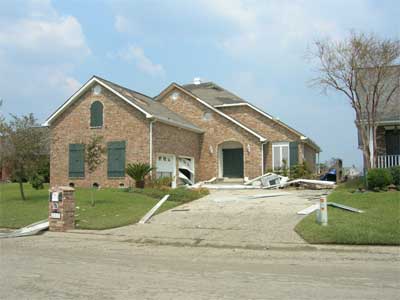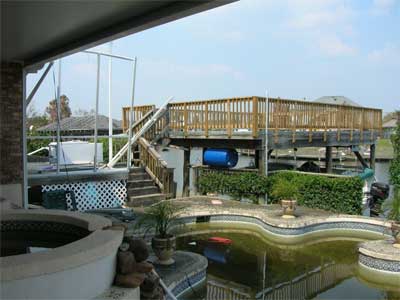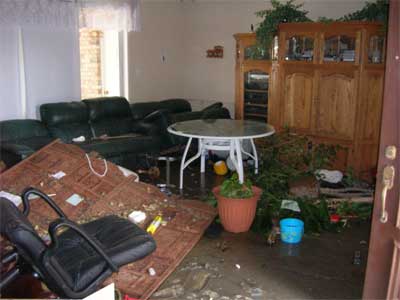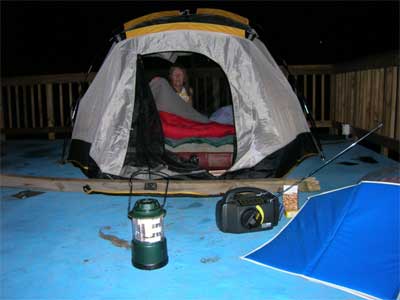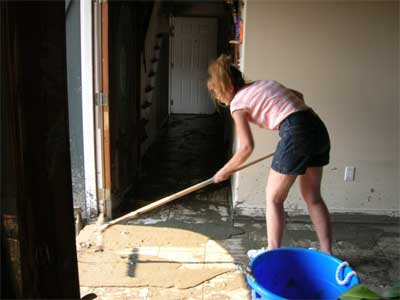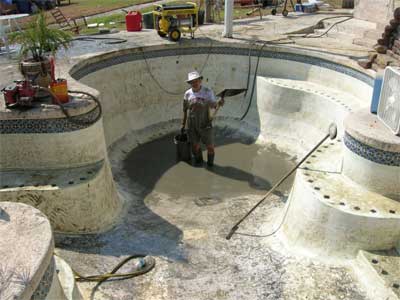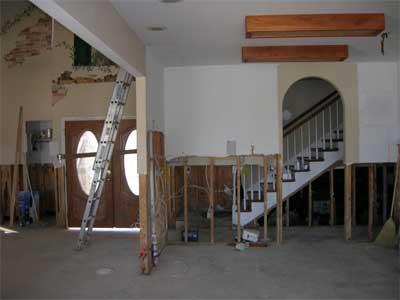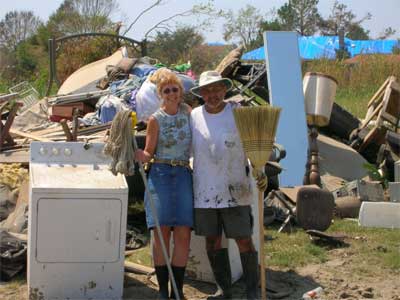|
Our Katrina story does not compare to the many tragic stories everyone has read about, but I thought you might want to know what happened to us anyway. We feel blessed that we are safe and had a home to return to, and the water did not stay in our home for days or weeks like so many others. The Friday before the storm, we felt confident that the storm would hit Florida, and we would not have to evacuate. Then Saturday, the storm shifted west, and it was headed straight for us. Sunday, it was clear that the category 5 storm was going to pass right over our home, and we knew we had to leave, but where to go? My sister lives 60 miles west in Loranger, La., but they stopped all evacuation west. Because traffic was so thick, they stopped allowing any more cars on the highways in that direction, so we decided to grab our photo albums and drive east. The Sunday before Katrina, Shiela and I, with my youngest son Sunny and our dog Ripley, left Slidell around 9:30 a.m. and got into bumper-to-bumper traffic when we reached Biloxi, Miss. Five hours later, we had traveled the final 40 miles and found a dump of a motel in Mobile, Ala. The motel was one of those rundown 30-unit single-story structures built in the 1950s. In the "it's a small world" category, I ran into the Millers staying at the same motel. The Millers were my neighbors in 1965 when our homes were flooded by Hurricane Betsy, and here we were 40 years later, going through another hurricane together. My oldest son, Brian, took his wife and his 10-month-old son and evacuated north to Tennessee. My middle son, Rocky, stayed with a friend's family in Baton Rouge. After spending two nights in the motel dump without electricity, I was able to contact my friend Pop-A-Top's sister who lives in Mobile. They took us in, and we were able to stay in their home for the next four days. They didn't have electricity or phone service, but their home was much more comfortable than the motel. They did have a crank radio that we stayed glued to, trying to get any information that we could about the damage to our subdivision. Katrina hit Mobile with a lot of downed trees and flooding along the coast; getting gas and supplies was a problem (two-hour gas lines with a $30 limit, also a run on generators, gas cans and supplies). Before we left to go back home, I bought a 1991 Dodge pickup truck, a generator, pressure washer, plywood and about $5,000 of other supplies that I thought I would need. We left Mobile on Saturday and traveled over the damaged bridge in Pascagoula, Miss., had to go through police road blocks and dodge debris covering the roads in order to get home. We finally arrived home on Saturday Sept. 3, around 2:30 p.m.
Our subdivision is on Lake Pontchartrain with 140-foot-wide waterways winding around to the rear of everyone's homes. The storm surge flooded all the homes in the subdivision. My home has a finished floor elevation of 12.5 feet MSL [mean sea level], and it had a water line about three and a half feet above the first floor, meaning the storm surge must have been about 16 feet high when it reached my home. My garage is three feet lower and sustained greater damage. A neighbor that stayed during the storm said that the surge came up quickly, lasted about three hours, and then left quickly. In addition to the storm surge, we had five foot waves crashing into our homes. As we drove to our home we saw that all the houses directly on the lake were gone, and huge mounds of debris were piled up against the homes across the highway from the lake, with large boats dry docked on homes. As we drove deeper into the subdivision, there was less debris, but the devastation was all around. When we arrived in front of our home, we saw that the storm blew out our garage doors, the front and back doors, ripped a lot of shingles off and exposed the plywood roof sheeting in three locations. My wood fence was blown down, the pool and hot tub were full of debris, mud and a few fish. My boat got trapped in the boathouse and was submerged (a total uninsured loss). A huge debris slick was floating in the water behind my home, covering half of the canal. A neighbor had a 40-foot sailboat leaning against his back door. My screen porch was gone, and the patio cover was damaged. Exterior bricks were broken where my shutter was blown off and cracked in one corner, due to the water rushing out and some washout under my slab. Inside the house, everything below the water line was destroyed. All the furniture was stacked up and pushed to the back of the house. The floors were covered in about two inches of thick, smelly marsh mud. Our refrigerator had fallen over and was wedged against our cabinets, and our garage freezer was laying on its side. Two other refrigerators of unknown origin were laying against our house, one in the front and another where our rear screen porch had been.
The first thing we did when we got home was to put on our rubber boots and gloves and tape the refrigerator closed, tie a rope around it, attach it to the pickup truck and drag it through the house and across the street (the stench would gag a maggot). The leather sofas were water-soaked and too heavy to move, so we took a sledge hammer and broke them into smaller pieces, tied ropes around them, and used the truck to drag them across the street next to the refrigerators. We had planned on sleeping on the second floor of our home, but it was so hot and smelly, we decided that it was not an option, so before dark, we pitched a tent on our back sun deck. Without electricity and water, we used a five-gallon bucket for a toilet and drained the melted ice water from the ice chest and took a sponge bath in the freezing-cold water before trying to go to sleep. It was hot and miserable and difficult to sleep, but with all electricity knocked out for miles around, I had never seen the stars so bright and beautiful. All night long military helicopters kept flying over at very low altitudes, shining their flood lights everywhere. Around two in the morning, a sheriff's patrol boat came by and lit us up with their flood light to check on us. We felt that we had been thrown back into the Stone Age; aside from the sheriff and military, we could have been the only people camping out in the Eden Isles subdivision -- isolation and darkness was everywhere. The next day, Sunday, Sept. 4, we broke apart more furniture and threw the trash across the street and used large, flat shovels and squeegees to try and get the marsh mud out of the house. I think the hardest thing for Shiela was throwing out her treasured clothing and shoe collection. All day long, military helicopters kept flying over. They were even refueling in midair behind a large tanker aircraft; it was like living in a war zone.
Around noon, we told Sunny to leave and try to enroll in LSU [Louisiana State University] since the University of New Orleans was closed. Shiela and I continued to work until dark, took another freezing-cold sponge bath and tried to sleep in the tent. Around midnight it started to rain, and the tent became unbearably hot, wet and miserable. We went to the second floor of our house, hoping it would be better, but it wasn't. Shiela was feeling sick with a terrible headache (probably from the stench she had been smelling for the last two days), and she finally broke down and had a good, well-deserved cry. Day seven, Monday, Sept. 5, things got better. My next door neighbor drove in to survey the damage with his son-in-law, Paul. They stayed a few hours before leaving to rejoin their family in Kentucky where they had evacuated, but before they left, Paul gave us the key to his home in Slidell that had only sustained minor water damage (buckled flooring). His home didn't have water or electricity, but it was clean, and he had a swimming pool that we used to bathe in. That night we ate MREs (Meals Ready to Eat) that the National Guard had given us and raided Paul's beer and wine selection (with his permission). After what we had been living in, it was like a five-star resort, and we finally slept well and felt refreshed. The next few days are a blur of ripping things out and throwing what had been treasured posessions across the street into the trash pile. Mucking out my swimming pool became a full day of back-breaking work. I borrowed a pump to drain the pool and spent a full day removing debris and shoveling marsh mud out of the six-foot-deep concrete hole.
We finally found a contractor and hired him to rip out sheetrock and insulation. I also had the contractor build walls to close in the garage where the doors had blown out. The contractor had a pump he used to pump canal water into our house to hose out the muck. After the muck was washed out, we washed everything down with bleach. As strange as it may sound, our spirits were much higher after getting our home gutted and washed out. You can now stand in my bedroom and look across the house, through the walls all the way to the other side of the house. When we weren't working on our home, we worked on my mother-in-law's home two blocks away and Brian's home in Slidell, which got about four feet of water. Of course, driving around through the debris, I got two flat tires, and both were on the side walls and couldn't be fixed. I had to buy new tires after getting stranded on the side of the road because the truck's spare tire was dry-rot, and the jack that came with the truck did not work. I lost about 15 pounds on the Katrina diet, but I wouldn't recommend it to anyone. I also take Doans pills every morning and night to ease all the aches and pains that I now have from my shoulders to my feet. Day 12, Saturday, Sept. 10, things got better! One of Brian's friends told us that his parents had an RV in their backyard that we could stay in. The Zagorskis are a retired couple living in the section of Slidell that sustained very little storm damage, and it was great to be able to take hot showers, eat a hot meal that was not squeezed out of a plastic bag, use a washer and dryer, and most of all, sleep in a bed with air-conditioning. The Zagorskis were wonderful to us; when we came in tired each night, we were able to throw our filthy clothes into the washing machine, take a hot shower, eat a hot meal (that Mrs. Zagorski prepared for us), drink a cold beer and sleep in air-conditioning each night. Our dog Ripley also enjoyed the Zagorski's big back yard. We owe them a big debt of gratitude!
Our cell phone (Cingular) was still not working so we changed to T-mobile and discovered the salesman lied; their service did not work either. We ended up with Verizon, which is working. Once we established phone service, we were able to contact my sister and let her know we were OK; our insurance company to arrange for an inspection; and Rocky to make sure he was OK. It would have been so nice to make one phone call and arrange for all assistance and inspections, but instead I had to repeatedly call my homeowner's insurance company and leave messages that were never returned; call my flood insurance company and leave messages that were never returned. I was unable to get through to FEMA; Rocky finally applied for us on line from Baton Rouge, and forget about contacting the Red Cross -- it was impossible. Finally, the homeowner's adjuster showed up at night with a flashlight, spent about 45 minutes walking around in the dark, and left. Two weeks later, I saw his report and confirmed that he had left out most of the wind damage. A week after the wind inspector, the flood inspector came by for 45 minutes, took some measurements, and left. Their report was a little closer to reality, but they missed about $40,000 of damage. In addition, I had a lot of things that simply are not covered by either wind or flood insurance, i.e. my swimming pool and my 24-foot deck boat. Like so many other people, I am now caught in the trick bag: what damage was caused by wind and what was caused by storm surge, who will pay for what and how much. The house is gutted and I'm ready to start rebuilding, but the insurance company still does not accept the fact that my roof has structural damage, [and does] not just [need] new shingles. Until I get that resolved, I'm at a standstill. I've been on a lot of waiting lists; once power was restored to the subdivision I was on a three-week list to get an electrician to fix my electrical panel. Now I'm on another eight-week list for kitchen cabinets. Once I can start reconstruction, finding contractors and materials will be a real challenge. Traffic in Slidell is very thick with the influx of hundreds of evacuees from other more devastated areas and contractors; trips that took 20 minutes before Katrina now take an hour.
Rocky, in his first year of law school, stays in Baton Rouge, trying to keep up with his studies while working as our communications hub, contacting the insurance companies, contractors, etc. Although Sunny is now enrolled at LSU, he still doesn't have any place to sleep because so many displaced students have enrolled there. He goes to class, studies in the library and sleeps on couches at different friends' apartments and drives home every weekend to help work on the house. The weekend of Oct. 15, Sunny decided to do a little fishing behind our house, discovered that he was catching more crabs than fish and put out a bunch of crab lines so we could have a crab boil. Somehow, he managed to stick a hook through his finger, and we spent five and a half hours in the emergency room, waiting for them to pull the hook through and cut it off, but he had caught 30 crabs, and we had a nice crab boil the next day. That same weekend, I also did something very stupid. While trying to repair my water-damaged boat hoist motor, I set the extension ladder on the boat and climbed 15 feet up to the motor when the boat moved and the ladder fell down, leaving me hanging above the edge of the boat and debris in the water. I knew that if I fell there, I could be seriously injured, so I somehow managed to shimmy along the boat lift shaft about 10 feet to a clear spot and drop into the water with my new Verizon cell phone in my pocket. I then had to go diving in order to retrieve the ladder and to look for the wrench that was also dropped into the water. I never did find the wrench, but I did get a new phone. Although we were very fortunate, tragedy did not escape our family completely. Shiela's sister-in-law lost her father and mother, who were trapped in New Orleans, and after evacuating to Lafayette, Shiela's father, who was already in poor health, died on Oct. 15. Like I said, our Katrina story does not compare to the many tragic stories you may have read about, and we are better off than a lot of people, but I thought you might enjoy hearing our story anyway. Things are getting better everyday; the bridge connecting Slidell with New Orleans has been repaired, allowing one lane of traffic in each direction, I started back to work on Monday Oct. 17, and I hope to complete my home repairs by next summer -- just in time for the next hurricane season. home + introduction + watch online + interviews + analysis + 14 days posted nov. 22, 2005 FRONTLINE is a registered trademark of wgbh educational foundation. | SUPPORT PROVIDED BY
|
